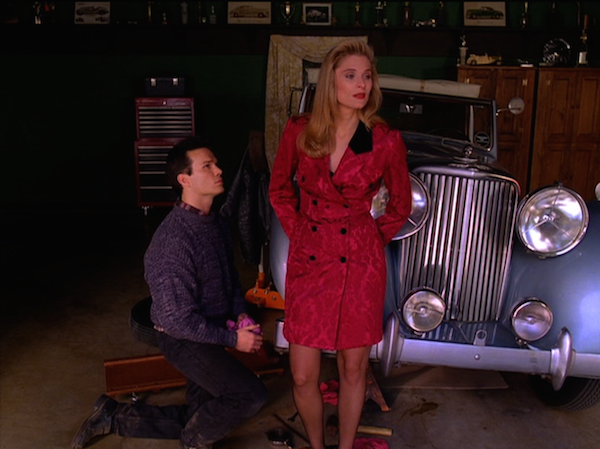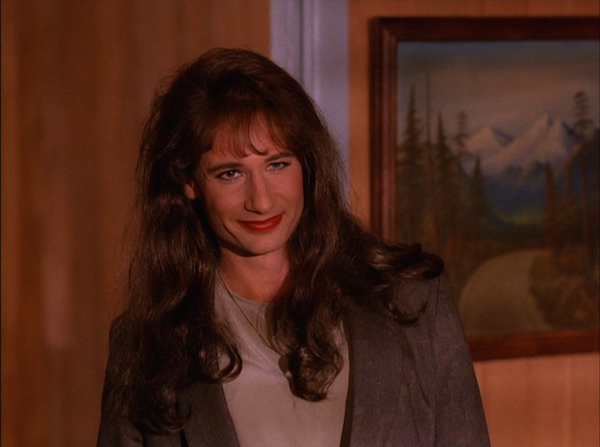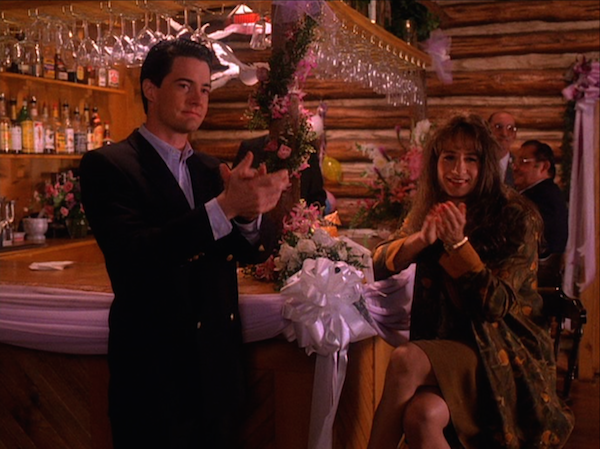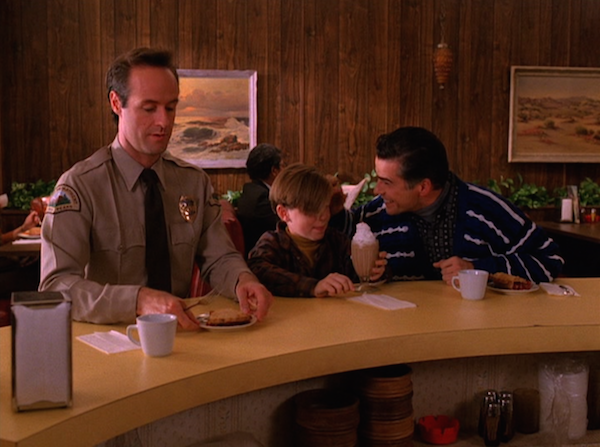Twin Peaks, Season 2, Episode 11, “Masked Ball”
Written by Duwayne Dunham
Directed by Barry Pullman
Aired December 15, 1990 on ABC
“There is also a legend of a place called the Black Lodge, the shadow self of the White Lodge. Legend says that every spirit must pass through there on the way to perfection. There, you will meet your own shadow self. My people call it the Dweller on the Threshold. But it is said, if you confront the Black Lodge with imperfect courage, it will utterly annihilate your soul.” – Deputy Hawk
The long-awaited revival of Twin Peaks returned from its own horrific limbo in the Black Lodge earlier this month, when David Lynch announced on Twitter that he’d worked out a deal with Showtime to honor his original commitment to direct the third season—only six weeks after he’d walked away from the project in a similarly public fashion. The news was met with universal acclaim and relief, because after being told this unique show was coming back, it felt wrong that the auteur from whose mind it sprang had to be involved to usher his creation into its next stage of life. They wanted to see it so much, in fact, that the show’s original actors even took to social media to offer character-specific similes on what losing him would mean to the show.
However, as with everything in Twin Peaks, there’s another, darker side to the wishes of the fans: no one wants to see Twin Peaks without David Lynch because they remember how awful Twin Peaks eventually became without David Lynch. Once the mystery of Laura Palmer’s death was solved and Lynch and Mark Frost moved away from the project, Twin Peaks began to flounder in its search for something new. It found itself going down ever more problematic and awful paths, collapsing in efforts to recreate a dynamic and quirk that had slipped out of reach. Some of that difficulty was on display in “Dispute Between Brothers” with the contrivance to keep Cooper in Twin Peaks, and “Masked Ball” further foreshadows a turn for the worst. It’s not a terrible episode, but it doubles down on things that were previously terrible, and the good is barely enough to outweigh the bad.
 Any discussion of the bad needs to start with the worst of it, which roars onto the screen right away: the road adventures of James Hurley. Whoever thought that James—easily the least interesting character and performer in the ensemble—needed to have his own storyline should be tested for drugs or cerebral hemorrhages, because this material is garbage from start to finish. Every one of his lines about self-discovery is devoid of self-awareness or irony, written and delivered dreadfully. (“I guess I’m not so interested in how my bike looks as in where it can take me. … It’s not really a place, it’s a feeling.”) And the decision to have James hit up the jukebox and play the same phantasmagoric track that Bobby Briggs laid down all the way back in the pilot isn’t just lazy, it’s an insulting reminder of better times.
Any discussion of the bad needs to start with the worst of it, which roars onto the screen right away: the road adventures of James Hurley. Whoever thought that James—easily the least interesting character and performer in the ensemble—needed to have his own storyline should be tested for drugs or cerebral hemorrhages, because this material is garbage from start to finish. Every one of his lines about self-discovery is devoid of self-awareness or irony, written and delivered dreadfully. (“I guess I’m not so interested in how my bike looks as in where it can take me. … It’s not really a place, it’s a feeling.”) And the decision to have James hit up the jukebox and play the same phantasmagoric track that Bobby Briggs laid down all the way back in the pilot isn’t just lazy, it’s an insulting reminder of better times.
The awfulness is compounded by the fact that he meets up with wealthy woman Evelyn Marsh (Annette McCarthy), a character with even more cliched dialogue than him (“Men are always all right. Right up until they pull the trigger”) who hires him as a live-in mechanic. Right away, beyond James’ dullness, there are two major problems with this storyline. First, it further isolates James from daily life in Twin Peaks, meaning the one thing that could occasionally salvage the character is gone and he has to carry a story himself, something he has no track record of doing. Second, Evelyn’s clear femme fatale shading and cryptic talk about her husband pushes Twin Peaks over the line from borrowing and satirizing soap opera conventions and turns it into a story that could have been pulled right from an episode of Invitation To Love. The show has gone from including meta-commentary to becoming the very thing it once commented on, and not an ounce of it works.
There’s similarly bad stuff going on back in Twin Peaks, as the show’s lack of subtlety now translates to offering up wide comedic strokes. The Milford wedding takes up an unreasonable amount of time in the latter half of the episode, and despite efforts to liven the proceedings up with Pete and the Log Lady offering various commentary, the bickering of Dwayne and Dougie contains no narrative weight or amusing punchlines. In the latest interminable stage of the Andy/Dick/Lucy love triangle, Dick’s taken a young ward named Little Nicky under his wing, and events quickly move into slapstick at the expense of both him and “Uncle” Andy. And Nadine leg-pressing 600 pounds to impress Mike (“He has the cutest buns!”) and being recruited to the wrestling team is a thing that happens. It’s all broad swings, and despite chuckling at absurdity it mostly generates a painfully awkward silence.
But despite all the awful stuff that runs through this episode, there’s still a lot to like. “Dispute Between Brothers” ended with Major Briggs vanishing in a manner that would inspire the pilot of The X-Files, and “Masked Ball” goes one step further by casting one of that show’s future leads, with David Duchovny as DEA Agent Dennis Bryson. Or rather, Denise Bryson—Cooper’s old comrade has undergone an epiphany following an undercover operation and now identifies as a woman. “It was a very confusing two weeks,” she wryly admits to Cooper. Duchovny is terrific in this role, portraying Denise with a poise that allows her to be both businesslike and flirtatious, even as she’s aware of how her appearance takes people aback.

Elsewhere in the hotel, the events of the last few days—nearly screwing his daughter, being arrested for murder, swindled out of Ghostwood Estates—have taken their toll on Ben Horne, who’s reduced to watching family movies on a projector and mumbling Shakespeare. His behavior is more on the wavelength of weirdness that Twin Peaks viewers have come to expect, mumbling about the “spatial relationship” and “resonance” of the furniture in his office in a way that uses the show’s established verbal and visual vocabulary. Plus, Richard Beymer chews scenery with more gusto and aplomb than anyone else on this show, so it’s a treat watching him be the one person to finally snap as a result of all the craziness around him. Craziness that includes the loss of One-Eyed Jack’s, as Hank is quick to remind him (and the audience) that Jean Renault is still lurking out there.
 Speaking of lurking, Windom Earle also makes his presence felt with another cryptic chess instruction to Cooper, a long letter speaking of hobgoblins and the promise of doing anything to kill the king. And it’s a threat that comes right on the heels of Cooper being at his professional weakest, stripped of his badge and gun as a result of the aforementioned Jean’s scheming. Yet despite all his troubles, Cooper appears to be even more above things than before, his speech to the FBI investigators (another terrific bit of earnestness from Kyle MacLachlan) full of the loftiest goals: seeing beyond fear, looking at the world with love, what lies in the darkness. If “Dispute Between Brothers” contrived to keep him in “Twin Peaks,” “Masked Ball” is about how his time in this town has reshaped a worldview that was already pretty open and explorative. The Bureau values he spoke of in “Realization Time” are still important, but they’re not the only code he has to follow.
Speaking of lurking, Windom Earle also makes his presence felt with another cryptic chess instruction to Cooper, a long letter speaking of hobgoblins and the promise of doing anything to kill the king. And it’s a threat that comes right on the heels of Cooper being at his professional weakest, stripped of his badge and gun as a result of the aforementioned Jean’s scheming. Yet despite all his troubles, Cooper appears to be even more above things than before, his speech to the FBI investigators (another terrific bit of earnestness from Kyle MacLachlan) full of the loftiest goals: seeing beyond fear, looking at the world with love, what lies in the darkness. If “Dispute Between Brothers” contrived to keep him in “Twin Peaks,” “Masked Ball” is about how his time in this town has reshaped a worldview that was already pretty open and explorative. The Bureau values he spoke of in “Realization Time” are still important, but they’re not the only code he has to follow.
Cooper’s language further colors the looming confrontation between himself and his old partner: he speaks of focusing “beyond the board” at the same time Earle write about skirmishing knights and the sacrifice of queens. One man is freeing himself of restrictions, while one is crafting a game that operates on the restrictions fair to him and no one else. It’s a clash of personalities that portends an interesting match between the two—and a possible center that post-Laura Twin Peaks badly needs.
Pie crusts and coffee grounds:
- It is happening again. Welcome back to Sound On Sight’s Twin Peaks coverage! Like Lynch we’ve been out of commission for a while, but we’re back and ready to bring this project to its conclusion. And we’ll be mixing it up a bit: Jake and I will be switching off episodes for the rest of the series, teaming up to discuss the finale at great length in a few months.
- Log Lady intro: “Is life like a game of chess? Are our present moves important for future success? I think so. We paint our future with every present brush stroke. Painting. Colors. Shapes. Textures. Composition. Repetition of shapes. Contrast. Let nature guide us. Nature is the great teacher. Who is the principal? Sometimes jokes are welcome. Like the one about the kid who said: ‘I enjoyed school. It was just the principal of the thing.’”
- Speaking of Twin Peaks going full-on soap opera, it’s the dramatic return of a character presumed dead! Andrew Packard (played by Academy Award-nominated Irish actor Dan O’Herlihy) turns out to be very much alive and in cahoots with his sister to retaliate against Josie and Eckhardt for their role in conspiring to kill him.

- Going back to Lynch and his involvement in Twin Peaks, Gordon Cole once again pops up in Twin Peaks—over the phone from Bend, Oregon—and expresses his full support for Cooper in the investigation. “DON’T LET ‘EM RATTLE YOU, COOP. THESE GUYS MAKE A LIVING LOOKING THROUGH OTHER PEOPLE’S DRAWERS. MAY A SMILE BE YOUR UMBRELLA. WE’VE ALL HAD OUR SOCKS TOSSED AROUND. CATCH YOU LATER.”
- Always a treat to get Cooper/Audrey scenes, and the moment of them dancing at the wedding is great despite its briefness. “The wonderful thing about dancing, Audrey, is that you never know when to step the lead. You just have to hang on and hope the music takes you there.”
- “Weddings are a seasonal thing, like the return of the salmon.”
- “Cooper, you may be fearless in this world, but there are other worlds.”
- “Uncle Andy went funny boom boom, didn’t he.”
- “A stag party, and I wasn’t invited?”
- “Well, this is all a pretty amazing disclosure, Denise.”
Next week: The Milford honeymoon comes to a tragic ending, and the James/Evelyn story tragically refuses to end, as we head into “The Black Widow.”




